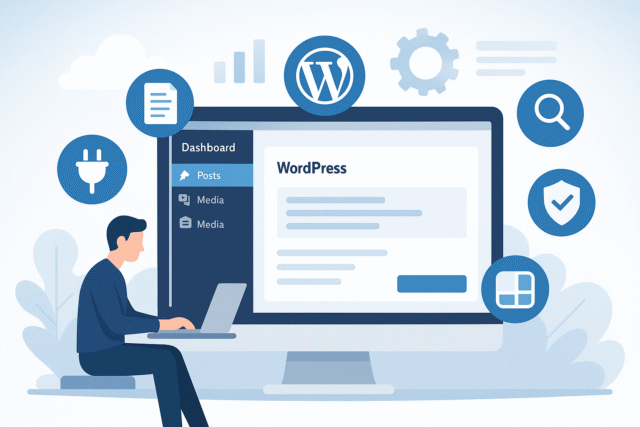In the dynamic world of the internet, where content is king, having a reliable, flexible, and user-friendly system to manage that content is crucial. Enter the Content Management System (CMS)—the backbone of most modern websites. Among the many CMS, WordPress stands out as a powerful, versatile, and accessible platform. But what makes WordPress so popular, and how does it compare to other CMS platforms? This blog delves deep into WordPress and the broader CMS landscape to provide a thorough understanding of their roles in today’s digital world.
What is a Content Management System (CMS)?
A Content Management System (CMS) is a software application that allows users to create, manage, and modify content on a website without needing specialized technical knowledge. Instead of writing code from scratch, users can rely on a graphical interface to manage digital content.
Core Features of a CMS:
- Content Creation: Create and edit text, images, and multimedia.
- Content Storage: Organize content in databases.
- Workflow Management: Enable roles and permissions (e.g., authors, editors, admins).
- Publishing Tools: Schedule, preview, and publish content.
- Design Management: Customize themes and layouts.
- Plugin/Extension Support: Add new functionality without modifying core code.
Popular CMS platforms include WordPress, Joomla, Drupal, Magento (for eCommerce), Shopify, and Squarespace.
Introducing WordPress: The Powerhouse CMS
WordPress is an open-source CMS written in PHP and paired with a MySQL or MariaDB database. Launched in 2003 by Matt Mullenweg and Mike Little, it began as a blogging platform and has since evolved into a comprehensive CMS capable of handling everything from small blogs to enterprise-level websites.
As of 2025, WordPress powers over 43% of all websites globally—a testament to its popularity, scalability, and user-friendliness.
Why WordPress Dominates the CMS Market
1. Ease of Use
WordPress has an intuitive dashboard that allows users to manage content, themes, plugins, and media with minimal training. This makes it ideal for beginners and non-technical users.
2. Open Source and Free
Being open-source, WordPress is free to use and customize. A vibrant community contributes to its development, ensuring constant innovation and improvement.
3. Extensive Plugin Ecosystem
With over 60,000 plugins available in the official WordPress Plugin Directory, users can add almost any functionality—from SEO optimization to e-commerce, membership systems, and more.
4. Theme Flexibility
Thousands of free and premium themes allow users to change the appearance of their site effortlessly. Many themes are customizable, mobile-responsive, and optimized for speed.
5. Strong SEO Capabilities
WordPress is inherently SEO-friendly. It uses clean permalink structures, offers customizable meta tags, and integrates easily with popular SEO plugins like Yoast SEO and All in One SEO Pack.
6. Community and Support
A massive global community means you’re never alone. Whether it’s through forums, blogs, YouTube tutorials, or online courses, support is readily available.
WordPress.com vs. WordPress.org
It’s crucial to distinguish between:
- WordPress.com: A hosted platform where your website is managed by Automattic (the company behind WordPress). It offers limited customization unless you’re on a paid plan.
- WordPress.org: The self-hosted version where you download the WordPress software and install it on your own web hosting. This version offers full control and flexibility.
For businesses, developers, and serious bloggers, WordPress.org is typically the preferred choice due to its scalability and customization options.
Use Cases for WordPress
Although it started as a blogging platform, WordPress has grown to support a wide range of applications:
1. Personal Blogs and Portfolios
Writers, artists, and photographers use WordPress to showcase their work in a professional and visually appealing way.
2. Business Websites
Small and medium businesses rely on WordPress for its affordability, ease of use, and ability to present products or services effectively.
3. E-commerce Stores
With plugins like WooCommerce, WordPress becomes a robust eCommerce platform capable of managing products, payments, and shipping.
4. Educational Platforms
Online courses and learning management systems (LMS) can be built using plugins like LearnDash or LifterLMS.
5. Community Forums and Membership Sites
Plugins such as BuddyPress or MemberPress allow for the creation of online communities and gated content platforms.
WordPress vs. Other CMS Platforms
Let’s compare WordPress with other leading CMS solutions.
1. Joomla
- Pros: More built-in features than WordPress; suitable for complex websites.
- Cons: Steeper learning curve; smaller community.
- Best For: Sites requiring granular user control or multilingual support.
2. Drupal
- Pros: Extremely flexible and secure; preferred by developers.
- Cons: Not beginner-friendly; high development cost.
- Best For: Enterprise-level websites and government platforms.
3. Shopify
- Pros: All-in-one solution for eCommerce; easy to set up.
- Cons: Monthly fees; less control over customization.
- Best For: Quick eCommerce setups without technical overhead.
4. Squarespace/Wix
- Pros: Drag-and-drop builders; beginner-friendly.
- Cons: Limited customization and scalability.
- Best For: Simple websites, portfolios, or personal projects.
WordPress Stands Out Because:
- It offers the best balance between usability and power.
- It caters to both beginners and developers.
- It’s not locked into one provider or payment plan.
SEO and Digital Marketing with WordPress
SEO is a key part of digital strategy, and WordPress excels in this arena.
Key SEO Advantages:
- Clean code structure and mobile responsiveness.
- SEO plugins for optimization tips, sitemaps, schema markup, and more.
- Blogging capabilities for content marketing.
- Integration with tools like Google Analytics, SEMrush, and social media.
With WordPress, businesses can improve their online visibility, drive traffic, and convert visitors effectively.
Security in WordPress
Security is often a concern with open-source platforms. WordPress addresses this in several ways:
Tips for WordPress Security:
- Regular Updates: Always update WordPress core, themes, and plugins.
- Use Trusted Plugins/Themes: Avoid nulled or suspicious third-party code.
- Security Plugins: Use tools like Wordfence, Sucuri, or iThemes Security.
- Backups: Use plugins like UpdraftPlus to maintain regular backups.
- SSL Certificates: Essential for encryption and Google ranking.
While no CMS is invulnerable, WordPress security can be robust with the right measures.
The Future of WordPress and CMS Platforms
With the rise of headless CMS, AI integrations, and no-code development tools, the CMS landscape is evolving rapidly.
Trends to Watch:
- Headless WordPress: Separating the back end from the front end for more flexible front-end experiences (e.g., using React or Vue.js).
- AI Integration: Tools for content generation, SEO audits, and automation.
- Mobile-first Design: Continued emphasis on responsive and mobile-optimized themes.
- Performance Optimization: Faster load times and improved Core Web Vitals.
- Gutenberg Block Editor: Further refinement of WordPress’s block-based editing system.
WordPress continues to adapt, ensuring it remains relevant and future-proof in the ever-changing web environment.
Conclusion
WordPress has redefined how individuals, businesses, and institutions manage their digital presence. Its status as the most popular CMS is well-earned due to its flexibility, ease of use, and rich ecosystem of plugins and themes.
Whether you’re a blogger, business owner, developer, or marketer, WordPress provides the tools and scalability to bring your vision to life. And as CMS technology evolves, WordPress is poised to remain at the forefront, empowering users to build smarter, faster, and more engaging websites.
So if you’re thinking of starting a website, or looking to migrate to a more powerful and customizable platform, WordPress might just be your best bet.
Want to Learn More?
Here are some resources to get you started:
- Wp-1click.com
- WordPress.org
- WooCommerce
- Yoast SEO Plugin
- WordPress Codex
- W3Schools WordPress Tutorial
Know More about WordPress and CMS







